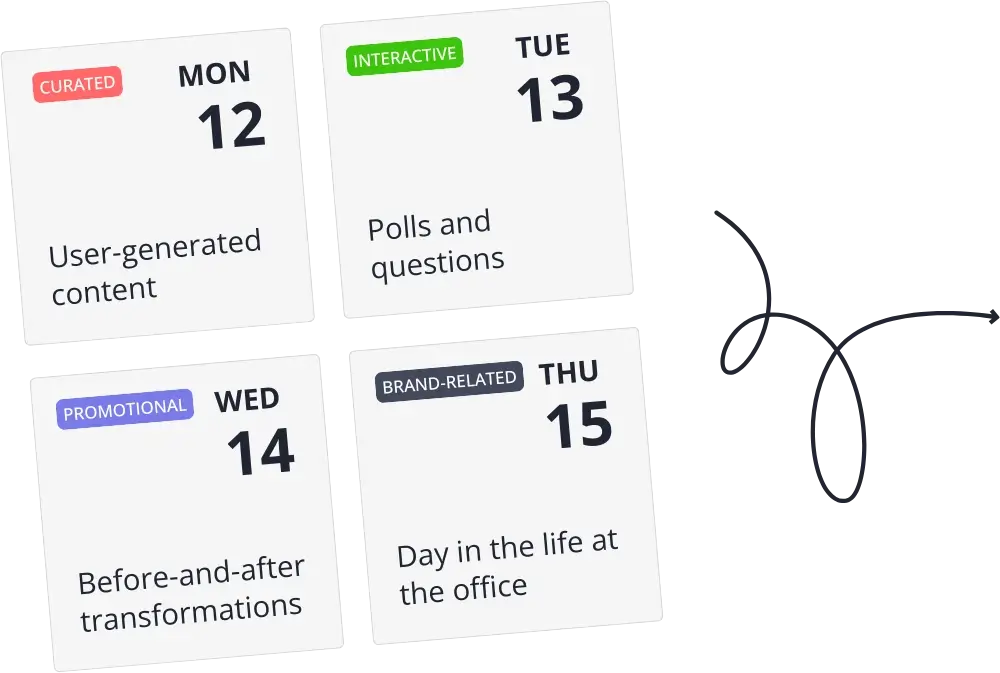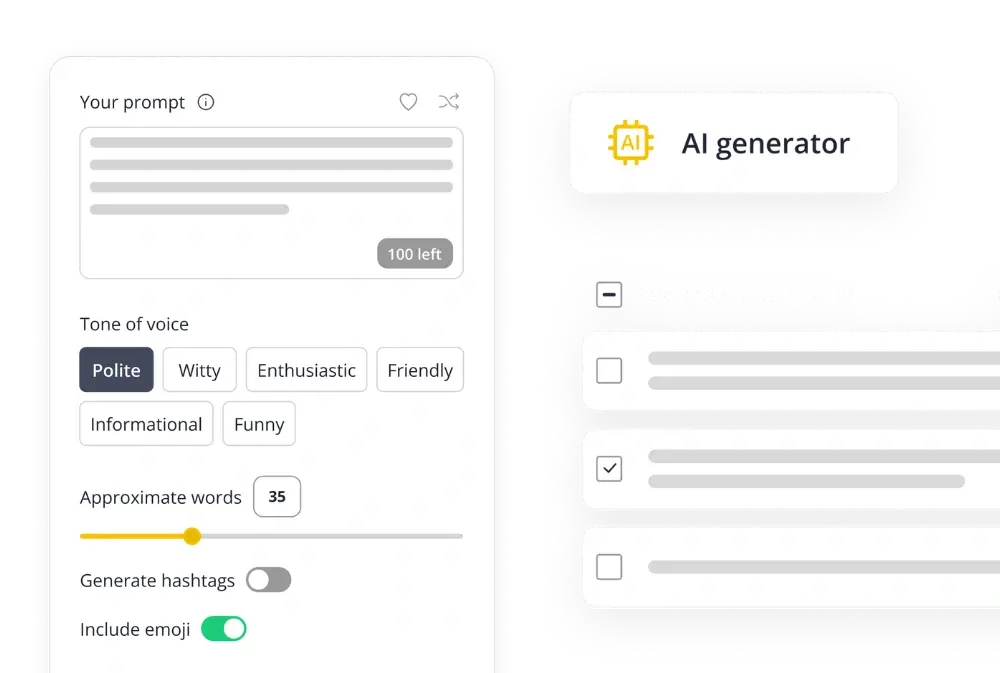
Content Manager at SocialBee
Let us guess. Are you interested in a social media consulting job, but you don’t fully know what it takes to become a social media consultant? Well, you have seen the title; you are in the right place.
If in the past businesses were unsure of the need for a social media consultant, now they know. As long as social media exists (and it doesn’t look like it’s going anywhere), you will have an important role to play in this industry.
Now, let’s get started, shall we?
What Does a Social Media Manager Do?
A social media consultant is responsible for growing a clients’ online presence by handling their activity on all social media platforms. Moreover, the duties also include content creation and publishing. All efforts go to building brand awareness and increasing sales.
To develop an efficient social media management strategy, a consultant needs to be a great researcher that knows everything about:
- Competition
- Target audience
- Trends
- Latest technology
Furthermore, a specialist also has to check metrics on all social media platforms. So, being able to interpret data and use the latest social media tools is imperative to the success of such a career. Of course, this is not the complete answer to the question “What does a social media manager do?”. Keep reading to get a full view of what is expected from a social media consultant.
Skills for Successful Social Media Consultants
In social media consulting, the list of skills required is almost as long as the to-do list. To help you out, we’ve compiled a few essentials you should work on to become social media consultant:
- Communication – Social media consultants know what, how, and where to communicate. Content writing is not just a creative exercise, it is a way to attract and maintain a reader’s attention and redirect it towards your brand. Moreover, it requires a deep understanding of social media platforms and targets: your employer’s needs audience segments.
- SEO – Search engine optimization is a must for social media consultants because it includes practices that bring traffic to client pages.
- Creativity – Half of your social media strategy relies on new inventive ideas that differentiate your clients from the competition. For a social media consultant, creativity becomes more of a cultured skill than a born ability.
- CRO – Social media consultants must develop strategies to make potential clients fulfill several desired actions, such as booking a call, filling in a form, buying a product, and much more; all for the success of their clients.
- Data analysis – When developing a social media strategy or monitoring the effects of a campaign, social media consultants review any data available and use it to improve reach and engagement.
- Project management – Working in social media consulting means that you will have to be part of different projects simultaneously. That is why effective Lean Methodology for organization and time management skills are essential in this field.
I. Step-by-Step Guide to Become a Social Media Consultant
Now that you know what you are getting into, it’s time to get into the logistics of building a social media career from scratch. Here are some practical steps to help you on your journey.
1. Research Before You Get Started
Venturing into a new social media career path might sound adventurous, but it can become stressful quickly. First, look at the job’s responsibilities. What Does a Social Media Manager Do? Then, conduct some research to identify any niche you could also use to customize your services. Next, look at the competition and see how you can build your social media consulting services to be better and develop a unique selling proposition.
After deciding on a potential client base, study your target audience and see how you can fulfill their business needs. As a result, you will develop quality services beneficial for you and your clients and make yourself a great candidate for social media jobs.
Even if you are starting now, you need to have a long-term vision to ensure you have a solid social media career path. Researching your industry first can save you time and energy that you might put blindly in something you might end up not wanting to pursue.
2. Get the Right Education
To work as a social media consultant, you first have to complete a bachelor’s degree related to Marketing, Public Relations, or Communications. When applying for social media jobs, you need to know that employers include this as a standard when picking candidates for interviews. Moreover, for professionals who want to start their social media consulting firm, studies in Business Management are a great advantage. If you haven’t followed any of those degrees, don’t get discouraged. Social media jobs don’t require a degree at all times, especially if you can prove your skillset.
3. Establish Your Expertise
To work in social media management, you have to learn many skills. Trying to master them all can become an overwhelming responsibility. For this reason, professionals develop a list of offerings based on their strong points. As a result, they provide quality services that are manageable for their time and abilities.
Although it is a must to have revenue streams from different services, it is also essential that you focus on delivering excellent results that will gain you more clients.
Here is a list of services that a social media specialist can provide:
- Planning a social media strategy
- Setting up social media accounts
- Creating and publishing content
- Researching trends and competition
- Providing coaching sessions
- Managing social media campaigns
- Getting involved in community engagement
4. Gain Experience
Starting a new social media career is a gradual process that comes with stress and fear of the unknown. It is a sign that you are doing something right that allows you to grow professionally.
You might not want to give up on your current situation just yet. Instead, try to take on a few clients to get used to the new workflow before applying to new social media jobs. In this way, you will have a safety net while experimenting with your career, making the transition less stressful.
To get hired as a social media consultant, you first have to gain some experience. Whether you are in college or already working in a different field, you still have to put in the work to get your foot in the door. You can always check out Jooble for job opportunities in the industry.
Marketing internships are a great way to gain expertise in social media management. However, most of the time, these opportunities only pay with experience and for a financially independent person who already has a job, time and money can become an issue.
Luckily, you have other options at your disposal, for example, freelance marketplaces like Freelancer, Upwork, and Fiverr. Here you can find entry-level projects that will help you get the results you want. All you need to do is to issue an invoice at the end of the collaboration, and that’s it!
Another approach to finding work opportunities is to join professional Facebook groups and start attending conferences where you can meet potential clients and employers in need of your services.
By the time you graduate or quit your old job, you will already have a client base, and a clear working strategy in mind. So, start searching for new collaboration opportunities on online platforms like LinkedIn, and start participating in events that have a high networking potential.
5. Build a Portfolio
Now that you have started to take on some new projects, it’s time to build a portfolio. Dedicate a section of your website to your best work and show potential employers what you can accomplish.
If you don’t have a lot of experience, try to demonstrate your skills and knowledge in other ways. A great way to do that is to start a blog and discuss topics of importance in the social media industry.
6. Grow a Social Media Presence
Nowadays, social media accounts have become an extension of a resume. If you are starting as a freelancer, even if you plan on getting hired or starting your own consulting business, you have to find creative ways to prove yourself. You already have the necessary social media knowledge, why not make your social media presence the prime example of your abilities.
Furthermore, use social media platforms to share your results, blogs, some significant innovations in your industry, and build yourself as a credible source of information.
7. Network Your Way Into Success
It is never too early to start networking. Why? Because building a client base takes time, and without it, you don’t have a viable revenue source. Surrounding yourself with professionals in your industry and from different fields is beneficial for any business person. In this way, you gain valuable connections that come in handy for future projects, and at the same time discover new business opportunities.
Benefits of networking:
- Find job openings/clients
- Get in touch with business partners
- Promote your services
- Gain influence
- Learn more about the industry
- Built a professional support system
- Develop your social skills
II. How to Raise Your Chances of Getting Hired
There are two essential aspects to consider before applying to a new job: your resume and interview skills. Keep reading to find out the main things to consider when looking for a different career opportunity.
1. Build Your Resume
The first interaction between you and your employer is through your resume. Based on the company you are applying for, you can customize and bring creative designs to your CV to make it stand out.
The most significant part of a resume is the content. So, keep it simple by including information relevant to the job opening. Let’s go over the main components of a CV.
Contact Information
In this section, you should include: name, address, phone number, email, and you can also add a link to your important social media accounts, like LinkedIn.
Education
The important aspects you should include in the education part of your resume are:
- Name of the institution
- Type of degree
- Date of graduation
- Other certificates that match the employer requirements
In the case of multiple degrees, they should be organized by starting with the highest-ranking one.
Experience
While completing your resume, take into consideration the job requirements and include only the relevant information. Job recruiters have to go through dozens of resumes, and reading long paragraphs that end up not being related to the job description can be frustrating. You want to make a good first impression and make sure you understood the assignment.
Furthermore, provide details about your past responsibilities that match the experience required for the job.
Skill Set
Once again, customize your skillset based on the information in the job description. Provide six to twelve abilities necessary for the job and tailor them to emphasize you qualify for the position.
Let’s take communication abilities as an example. Communication is a fundamental skill for any job, especially in social media. Stating that you are a good communicator might not be enough in this context.
What you want to do when you write down your communication skills is to get specific. For example, instead of writing down “good communicator”, try to make it match your employer’s needs and say “proficiency in targeted communication customized to each social media platform.
An ideal way to emphasize you are the right fit for the job is to back your claims with examples of accomplishments you achieved in your career.
Professional Objectives
This is not a mandatory section of a CV, but it sure makes a difference. Here you have the opportunity to state why the employer should choose you, and how the job aligns with your career aspirations. Besides, it is always nice to let the employer know that you are eager to be part of their team.
2. Get Ready For the Interview
Yay, interviews! No one said that, but it is still a reason to get excited. You passed the first step, who knows, maybe your dream job is around the corner.
Even though interviews are stressful experiences, they are learning opportunities that still have value. Even if you don’t get the job, you will be more prepared for the next one.
Now let’s take a look at some simple practices that make interviews easier to get through.
Research the Company
This step is detrimental for a successful interview because the interviewer will be able to tell if you took the time to get informed about the company. If you do your research, you show that you are serious about the job opening and see it as a career opportunity.
Additionally, it is also beneficial for you because you get to find out if the company values align with your own, and if it’s an overall good fit for you.
Put Together an Outfit
You are more than a first impression, but by the time they get to know how awesome you are, you need to look the part.
Based on the research you have done, you can probably tell the work environment you are stepping into. If you are still not sure, simple office clothing is a safe bet. You can look good and still be comfortable.
With all the stress of an interview, you don’t want to have any other distracting inconveniences along the way. So maybe leave home that tight jacket, or those uncomfortable shoes and enjoy the experience.
Prepare Yourself for Interview Questions
While you never know what the interviewer might ask, there are a few basic interview questions that will most likely come up, such as:
- What makes you a good fit for the job?
- Why do you want this job?
It is easier to have some ideas about what you plan to say, but don’t memorize answers because it will look very forced during the interview. Also, try to give answers linked to the job requirements and focus on details that show that you are the right candidate.
Be on Time
There is no surprise when it comes to punctuality. The golden rule is to arrive five-ten minutes early. So, make sure you look up the location and see how much it will take to get there to avoid traffic inconveniences.
Pay Attention to Body Language
Usually, interviews are stressful experiences that affect our confidence.
It is important to focus on your posture and maintain eye contact. Moreover, keep a friendly attitude and try to smile and make the best out of this opportunity.
The interviewer wants to have a good experience, so don’t be afraid to be yourself and put your best foot forward.
Prepare Questions for the Employer
At the end of the interview, you will have the opportunity to ask the employer several questions. It is essential to prepare them ahead of time because the stress of being in an interview might interfere with your ability to think of the right questions. Also, in this way, you will avoid that awkward thinking pause that might ruin the flow of the conversation.
Ask questions that are genuine of interest to you based on the research you previously conducted.
Now to You
If you made it this far, you now have an idea about the role of a social media consultant. What do you think? Are you up for the job?
You have a lot of work ahead of you. When in doubt, take a look at the steps in this article to stay on the right path.
If you want to learn more about the most relevant aspects of social media, make sure to stay tuned for our weekly blog posts.











